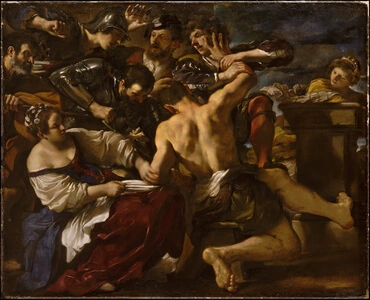Arcana Coelestia # 1706
1706. Verse 14 And Abram heard that his brother had been taken captive, and he brought out his trained men, born in his house, three hundred and eighteen, and pursued as far as Dan.
'Abram heard that his brother had been taken captive' means that the Interior Man perceived the nature of the state of the External Man. 'And he brought out his trained men, born in his house' means those goods residing with the External Man which were now released from the yoke of slavery. 'Three hundred and eighteen' means the nature of those goods. 'And pursued as far as Dan' means the beginning 1 of purification.
Poznámky pod čarou:
Battle

War in the Word represents the combat of temptation when good loves are assaulted by evil loves or false ideas. The evil that attacks comes from one of the many societies of hell, and it operates by arousing a selfish love in our mind that is contrary to what we know is right. Then our selfish love attacks the love that nourishes the wish to be a good person, and there is war in our minds. This is represented by wars that the children of Israel fought in and around the land of Canaan, of which there is a long history in the old testament. The selfish loves abound in our minds from our heredity, and the good loves come along with our conscience as it develops. If we had no conscience we couldn't be tempted; we would immediately follow the wishes of our selfishness and give in. But then the end result is that we are in slavery to the hells and will do whatever they want.
(Odkazy: Arcana Coelestia 1659 [3], 1664, 1683, 1788 [2])






